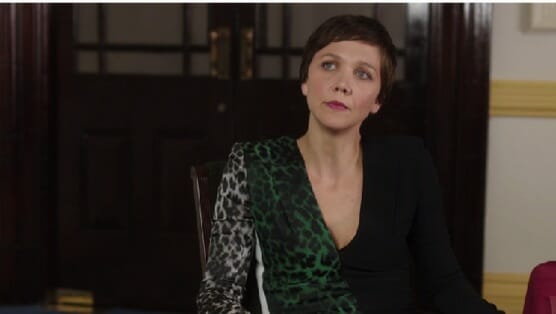The Honourable Woman: “The Empty Chair”
(Episode 1.01)

The Honourable Woman, The Good Wife, Memoirs of a Dutiful Daughter—based on the title alone we know that the new Sundance eight-part series will likely bring us a complicated notion of what it means to be a member of the so-called fairer sex. But in the pilot episode, Hugo Blick’s complex plot deals more with the implications of race and culture in the political sphere, than womanhood—but the results are powerful, and one can expect gender issues to play a larger role soon enough. Of course, the series’ American debut comes at an interesting time; the Israeli/Palestinian conflict is inspiring constant debate and discussion, and The Honourable Woman could very well participate in such conversation. The narrative is fictitious—it’s a British spy thriller—but the political bent is based on historical and contemporary issues in the Middle East. So it has all of the makings for a fascinating television experience.
Vanessa “Nessa” Stein (played by Maggie Gyllenhaal) is an Anglo-Israeli business woman whose father’s corporation (The Stein Group, which she now runs) cannot escape the political ramifications of Middle East conflict—largely due to the work he did before his murder, when he was known as “the sword of Israel.”
“What a difference a war makes,” Nessa says in an opening speech. After she is made a Baroness, she acknowledges that Israel has thrived while Palestine has fallen victim to poverty—something she seeks to change. Stein seems like a good guy, as Gyllenhaal breathes a regal but appropriately exhausted air into her personality. She may be the honourable woman, but there’s something in that green and black leopard-print dress—and in the whisperings of other characters—that tells us she has her secrets too. That feeling of unease—which we also feel towards her brother Ephra Stein (played by Andrew Buchan) and, well, everyone on the series—is intentional. Stein finds herself in hot water throughout “The Empty Chair,” as she thinks for herself and makes decisions that are (whether she wants to accept it or not) translated into political statements. That the man she appoints for a huge and highly-anticipated collaboration is found dead (the result of a suicide that is likely not a suicide), and that old friends are full of resentment towards her (while others promise her that those secrets are safe), all adds to seemingly endless amounts of intrigue.
-

-

-

-

-

-

-

-

-

-

-

-

-

-

-

-

-

-

-

-

-

-

-

-

-

-

-

-

-

-

-

-

-

-

-

-

-

-

-

-








































